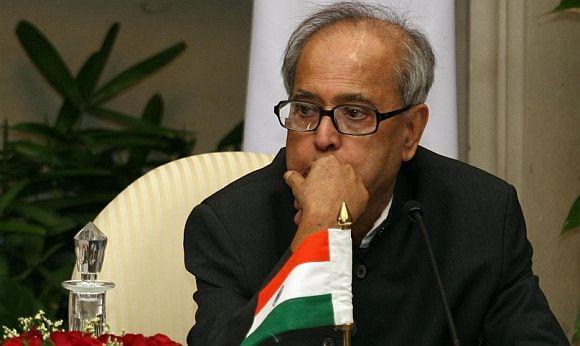 Irrespective of system of judges' appointment, the process must operate on "well-established and transparent principles to select the best" and no one can meddle with it, President Pranab Mukherjee on Saturday said while asking the judiciary to "reinvent itself through introspection and self-correction".
Irrespective of system of judges' appointment, the process must operate on "well-established and transparent principles to select the best" and no one can meddle with it, President Pranab Mukherjee on Saturday said while asking the judiciary to "reinvent itself through introspection and self-correction".
The statement, made in the backdrop of the historic apex court verdict quashing the National Judicial Appointment Commission Act, assumes significance as the President said that the judiciary is "autonomous" and a vital feature of democracy.
"...The appointment process must conform to the highest standards of probity. Whichever system of appointment we follow, it must operate on well-established and transparent principles to select the best.
"No one can meddle in the process. An autonomous judiciary is a vital feature of democracy. Yet being an important pillar of democracy, it must reinvent itself through introspection and self-correction, as and when necessary," the President said while inaugurating the Golden Jubilee Celebrations of the high court of Delhi at Vigyan Bhawan.
Mukherjee also said that there was the need for quick justice delivery system which should be "accessible" and "affordable" to all.
"Delay in administering justice is as good as denial. There are over 60,000 court cases pending in the apex court, another over 40 lakh pending in the high courts, and over 2.6
crore in the district and subordinate courts. The phenomenon of high pendency must change through multi-dimensional effort.
"Courts must have enough resources to boost their infrastructure. Vacancies in judicial positions must be filled up on priority. Having said that, expeditious selection must be no ground for sacrifice on quality," he said.
The President also hailed the Delhi high court for its efforts in witness protection scheme, e-filing and adopting mediation and conciliation as tools for alternate dispute resolution mechanism.
He also lauded the theme 'Justice for all' of the year-long Golden Jubilee celebration and said that the common law principle of 'locus standi' has been enlarged by the judiciary to broaden the scope of justice.
Besides the President, Chief Justice of India H L Dattu, Delhi high court Chief Justice G Rohini, Lt Governor Najeeb Jung and Delhi Chief Minister Arvind Kejriwal also spoke at the function.
The President dealt with the advent of Public Interest Litigation and said, "In the support of rights, courts have found a post card or newspaper article to be material enough to set-off judicial action. This has helped to bring justice closer to the common man."
He also referred to the issue of "judicial activism" and said, "it should not lead to the dilution of separation of powers. Each organ of our democracy must function within its own sphere and must not take over what is assigned to the others. In the exercise of powers by the legislature and executive, it is subject to judicial review.
"However in the exercise of powers by the judiciary, the only check possible is self-imposed discipline and self-restraint by the judiciary. The balance of power between the three organs of the state is enshrined in our Constitution. The Constitution is supreme. The equilibrium in the exercise of authority must be maintained at all times."
Provision of free legal service to the weaker sections would provide a strong impetus to the cause of 'Justice for all', he said. The Chief Justice of India, speaking at the function, referred to the contribution made by the Delhi high court through its outstanding judges and lawyers.
He also referred to the contribution made by Justice H R Khanna, one of the four first HC judges who later went to become a Supreme Court judge.
"Over the years, both the volume and number of litigation have increased many folds. However, the members of this court have remained undominated and their hard labour has resulted in a phenomenal rate of disposal.
"They have not sacrificed on the quality of justice with the quantity. This happened because of the endeavour of the judges and the bar," he said.
The CJI also appreciated the steps taken by the high court in adopting mediation and conciliation as tools for alternate dispute resolution mechanism.






 © 2025
© 2025